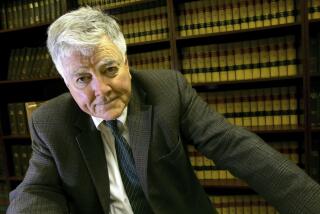Ideological Ghosts Attend McGovern Birthday Party
- Share via
WASHINGTON — Fans of George S. McGovern held a celebration for his 75th birthday here recently, but two uninvited guests almost spoiled the party.
Even in absentia, the memories of Lyndon B. Johnson and Richard Nixon defined the nature of the gathering-cum-symposium almost as much as recollections of McGovern himself. Linking all three men was the prolonged national tragedy that still casts a dark spell over U.S. politics--the Vietnam War.
Not that the occasion did not have lighter moments, most particularly a courtesy call by McGovern’s longtime ideological adversary, sometime Farm Belt ally and fellow failed presidential candidate, Kansan Bob Dole. “You can always get the truth from an American statesman after he has turned 70 and given up all hope of the presidency,” Dole quipped. “George and I have done both.”
“He’s going to be 75 years young, yet we know the journey has just begun,” sang David Amram, who had entertained crowds during McGovern’s Democratic presidential campaign. Indeed, the guest of honor--whose birthday is actually July 19--appeared just as trim as when he blew away his party’s establishment to claim the nomination 25 years ago.
Yet even as symposium participants focused on McGovern, their attention returned repeatedly to Johnson and Nixon and their roles in the struggle in Indochina.
“The war destroyed both their presidencies,” McGovern said before the event at the National Archives.
More than that, the war--combined with its outgrowth, the Watergate scandal--shattered old alliances and generated a wave of cynicism among citizens that still bedevils leaders today.
While McGovern’s White House bid ended in disastrous defeat--he carried only Massachusetts--he views his candidacy as his ultimate achievement because he believes it paved the way for America’s withdrawal from Vietnam. “The war could not continue after we mobilized 30 million Americans against it,” he declared, referring to his approximate vote total.
But after the last words had been uttered at the panel discussions and the final slice of birthday cake had vanished, one question remained. If the war was a tragic folly, why were McGovern and its other foes unable to stem America’s steady march deeper into the Vietnam quagmire?
McGovern blames his decision not to launch an all-out challenge to the war sooner on the limitations of U.S. politics. “I was restrained by what I thought the political system could absorb,” he explained. “I never went beyond what I could maintain publicly with credibility. But in my gut, I hated that war with a passion.”
The South Dakotan became the first senator to warn against the deepening U.S. military commitment in Vietnam, concluding in a 1963 Senate speech: “The trap we have fallen into there will haunt us in every corner of this revolutionary world if we do not properly appraise its lessons.”
But he held his fire for the next two years while Johnson succeeded John F. Kennedy and beat back the hawkish challenge of 1964 Republican standard-bearer Barry Goldwater, all the while laying the groundwork for escalating the war. “We didn’t want to do anything to exacerbate President Johnson’s problems in the presidential campaign,” McGovern explained at the symposium. More fundamentally, McGovern said, “I honestly believed that Johnson would sustain his campaign pledge not to widen the war.”
If McGovern was taken in by Johnson, he was outmatched in his ’72 campaign against Nixon. In the ignominy of that defeat, McGovern kept his sense of humor, telling a post-election audience: “For years I wanted to run for the presidency in the worst way--and I did.”
McGovern’s partisans contend the tactical mistakes he made were outweighed in the long run by the steadfastness of his convictions. “In this cynical time, it is a relief to look at McGovern’s career and see that an unreconstructed idealist could rise as far as he did,” said historian Arthur Schlesinger Jr.
More to Read
Get the L.A. Times Politics newsletter
Deeply reported insights into legislation, politics and policy from Sacramento, Washington and beyond. In your inbox twice per week.
You may occasionally receive promotional content from the Los Angeles Times.










